Let’s talk about Peacemaker, or as James Gunn put it, “The Best Worst Superhero”.
Six years ago I knew little about Peacemaker. I saw his character make an appearance somewhere in the twelve-issue limited series of Crisis on Infinite Earths. All I could think was that there had to be more to this guy than a gun and a funny hat.
The only thing I knew about the character was that he was part of one of DC Comics’ acquisitions from Charlton Comics. His character goes back to The Fightin‘ 5 #40 (1966) before he got his own five-issue run from Charlton before being canceled. He came to DC with a bunch of other properties, like the Blue Beetle, the Question, Nightshade, Thunderbolt, Judo Master, and Captain Atom.
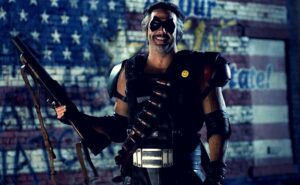
Here’s a bit of trivia that you might not know: many of these properties were used as the basis for Alan Moore’s Watchmen. Peacemaker, Blue Beetle, the Question, Nightshade, Thunderbolt, and Captain Atom were the blueprints of the Comedian, Nite-Owl, Rorschach, the Silk Spectre, Ozymandias, and Doctor Manhattan, respectively. So, when you think of Peacemaker, you might also want to think of Jeffrey Dean Morgan with an automatic weapon.
Plus, don’t knock Charlton Comics. They had some pretty outstanding talent working for them at one point. Names like Steve Ditko, Dick Gordiano, Pete Morisi, and Joe Gill were part of their creative team. There’s some serious DNA in those heroes.
But I digress. Let’s dig into Peacemaker and a bit of Vigilante as we know them.
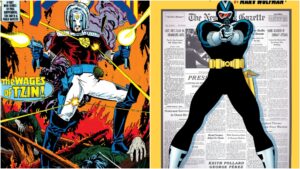
Three men have adopted the identity of Peacemaker in the comics
In an interview before the release of The Suicide Squad, James Gunn was inspired to make Peacemaker much like the Captain America television show character of the seventies (starring Reb Brown as Cap). He described writing Peacekeeper as “looking at current world issues through the lens of this superhero/supervillain/world’s biggest douchebag.”
That’s not quite who our hero is in the comics.
Three men have adopted the Peacemaker name and like all the men who have donned the pretty silver helmet, each has used heavy personal artillery to fight for peace. The comic book character’s origin was just a little different from those in the HBOMax series.
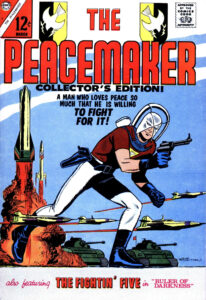
Christopher Smith, portrayed by John Cena in the show, was the first Peacemaker. Initially, Smith was a diplomat who was so dedicated to peace that he’d use non-lethal weapons to achieve it. He founded an organization called the Pax Institute. While the show makes it a point to say that the White Dragon, who was the head of a neo-Nazi organization, raised Smith. This was not the case in the comics. What was true is that Smith’s father was a Nazi commandant in a death camp. In both the show and the comics, Smith is haunted by his father, who criticizes him from beyond the grave.
The helmet is an interesting part of Smith’s character. Whether it is part of Smith’s mental illness or whether it is true, he believes that because of either his victims or deaths that happened nearby him; he absorbs all those spirits into his helmet and gets advice from them. Smith eventually meets his end when he uses a helicopter to crash into some tanks during a battle against the villain, Eclipso. His soul is seen in purgatory afterward.
The second Peacemaker was an anonymous man who took up the mantle. Presumably, he worked for the U.S. government as a member of the League Busters, an organization made to destroy the Justice League. He disappeared after that story and no one knows what has become of him.
The third Peacemaker was a man named Mitchell Black, who was recruited for “The Peacemaker Project”. Black was a surgeon. He united with the other “Charlton Comics” heroes for a mission and was presumably killed.
The people who were Vigilante
Several people have taken the name “Vigilante” in the DC Universe, including one old western gunman as well as Adeline Kane, who was Deathstroke the Terminator’s wife. The original modern-day incarnation of Vigilante as portrayed in Peacemaker is Adriane Chase.
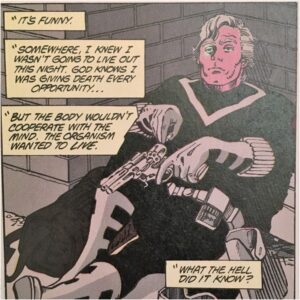
In the comics, Adrian Chase’s backstory is very much like the Marvel character, The Punisher. Chase, a New York district attorney, dedicates himself to a war on crime when mobsters kill his wife and daughter. Much like Peacemaker’s character, he has conflicting emotions regarding the justice of his actions.
Eventually, Vigilante hung up his goggles to become a judge where he felt he could serve justice better. During his absence from crime-fighting, two other men, Alan Wells (a fellow judge) and subsequently, Dave Winston (a bailiff), took up the mantel without Chase’s knowledge.
Ironically, Winston met his death in a battle against Peacemaker, and the original Vigilante killed Wells. It was after that Adriane Chase returned to being Vigilante, as it seemed to be the best way to protect his loved ones.
Chase found it increasingly difficult to handle the guilt of operating as Vigilante and as his mental instability grew out of control, he eventually took his own life.
Other men who took Chase’s mantle were Pat Trayce, Justin Powell, Donald Fairchild, and Dorian Chase (Adrian’s brother)
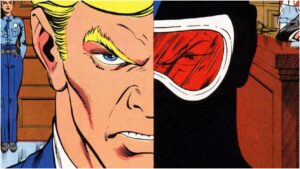
Unlike Peacemaker’s adaptation to the HBOMax series, Adrian Chase was nothing like his comic book persona. Chase’s character on the show was both comic relief and a mentally disturbed character. While we do not know the character’s backstory, what we know is that he is obsessed with two things: Peacemaker (being his BFF) and killing people. We also know that if he killed some innocent people as collateral damage, he would not spend too much time grieving over them.
Vigilante in Peacemaker is a sociopath or a man with Asperger’s Syndrome, as he completely cannot distinguish between actual conversation and sarcasm. He cannot to pick up on visual social queues, either.
Why Peacemaker is deeper than you think
One of the biggest obstacles I have in enjoying any film or television show in my house is my wife. As she is both an animal rights activist and a Buddhist, she cannot watch any media where 1) an animal gets killed or injured or 2) extraordinarily violent shows. The website, www.doesthedogdie.com gets a lot of traffic from the Peruzzi household.
There is stuff she just cannot watch with me. For example, while I have watched the entirety of Amazon Prime’s The Boys, I am convinced that any episode would drive my wife into a catatonic state.
Such is life.

That said, I had to watch both the Suicide Squad and Peacemaker back-to-back to get the full gestalt of the character. Within the first few minutes of watching The Suicide Squad, I came from it and told my wife that it was not for her.
Animals get killed and people explode. I won’t even go into how gorillas and chainsaws don’t mix.
But you absolutely need to see that movie to understand where the character is at the beginning of the Peacemaker series. Why? Because one of the biggest rules in storytelling is that characters must evolve or devolve in a story. They need to grow or change through their experiences.
Peacemaker is a portrait of how a hero survives a dysfunctional past.
So, this is where I give a fair warning to SPOILERS.
When we first meet our hero, we see him as James Gunn described him. He’s a douche. It’s a good word. We know everything we need to know about him for this movie within the first few minutes. We know he’s a deadly killer and we know that he’d eat a bag of dicks in the name of peace.
A consequence of the movie is Peacemaker had to kill Rick Flagg. The problem was that Flagg was not his enemy. This was where the character would have a psychotic break between two conflicting beliefs. He does not like killing people who aren’t his enemies and the other is he will kill to preserve peace.
While five months have passed since the Suicide Squad mission, our protagonist has not dealt with this trauma. Despite staying in a hospital for that time, Chris Smith is still recovering from his injuries in Corto Maltese. Thus, he is damaged goods. There is also an emotional wound within the hero that eats at him like PTSD. Hours after his release from the hospital, he met the ARGUS team, headed by Clemson Murn, and was told that he must work with them, or they will set off the bomb still inside his skull.
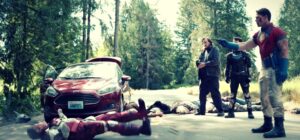
By the end of the first episode, we come to realize four things about the character. He doesn’t get along with the team. He doesn’t get along with his father. His only human friend is Vigilante. And lastly, he has only emotionally bonded to is his pet bald eagle, Eagley.
Why? Because he has never had a meaningful relationship with a human adult.
However, let’s get back to his father, Auggie Smith (aka The White Dragon). We see that this modern adaptation of the character is a neo-Nazi rather than a Nazi. They establish he is a shitty human being who would rejoice in how someone like Bloodsport was tortured as a child. What we discover is that this is not that much different from how he raised his younger son.
When I had time to binge-watch this show, it became apparent that the mental and emotional abuse are the roots behind Peacemaker’s douchey-ness. It all comes from his backstory.
Chris Smith’s scars are cumulative. His father made him stab an adult man to death and pit him against his older brother in a bare-knuckle fistfight that resulted in his brother’s death. That he accidentally killed his brother, who was probably the only person who loved him, resonates with him deeply—to where he still listens to the hair bands they used to rock to.
Rock music is how he honors his brother, Keith. It is also a continuing reminder of the Peacemaker’s sin against him.
“There is no one home in my house of pain.”

In the second episode, Chris Smith has an emotional breakdown when he listens to the rock albums he stole. Everything is coming to a head. The protagonist sees he is on the wrong path. He chastises himself because he cannot connect to his team. He doesn’t have the social skills to do so. Through Auggie Smith’s parenting, Peacemaker became a bully who did nothing but make fun of others. Why? It’s what his father would do. He cries because he knows he could be John Economos’s friend, but he realized he pushed him away.
Why is Peacemaker a douche? He is a douche because it was the only way he could bond with his father—by being douchey.
But our hero has some scruples.
He knows Murn by reputation. From what Peacemaker has heard, Murn cannot be trusted and knows that he’s done horrible things. This leads to another crisis in values. Remember, he would do anything for peace, even kill for it. Only this time, he’s told to kill kids, and no one is telling him why. He has lines he won’t cross.
I thought the character development of the protagonist and the supporting cast was superb. As the antagonist was not a definitive villain (outside of the White Dragon), the story became more a philosophical story rather than one from a typical comic book.
We even got to sympathize with the butterflies.
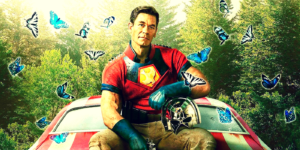
When Gunn finally gets on his soapbox to critique society, we can sympathize with the antagonist. The butterfly message was, “We’ve seen this before. We failed the same way you are failing. If you let us steer you in the right direction, we can save your planet.”
What is unspoken is “all it will cost you is your free will and that we will rule you.” Ultimately, this is what would happen. Each butterfly/human amalgamation would be faster, stronger, and more durable than any ordinary human, and each would be in a position of power.
If they could survive without the cow, how would we survive?
The end of Peacemaker is a gamble. The viewer, much like Peacemaker himself, asks, “Did he do the right thing or are we doomed to follow the same course the butterflies originally were on?”
Like a good story, Peacemaker gets the viewer to think about bigger issues. Gunn pulls no punches in showing that the fascist world of tabloid news and conspiracy theories is taking our attention away from things that matter.
